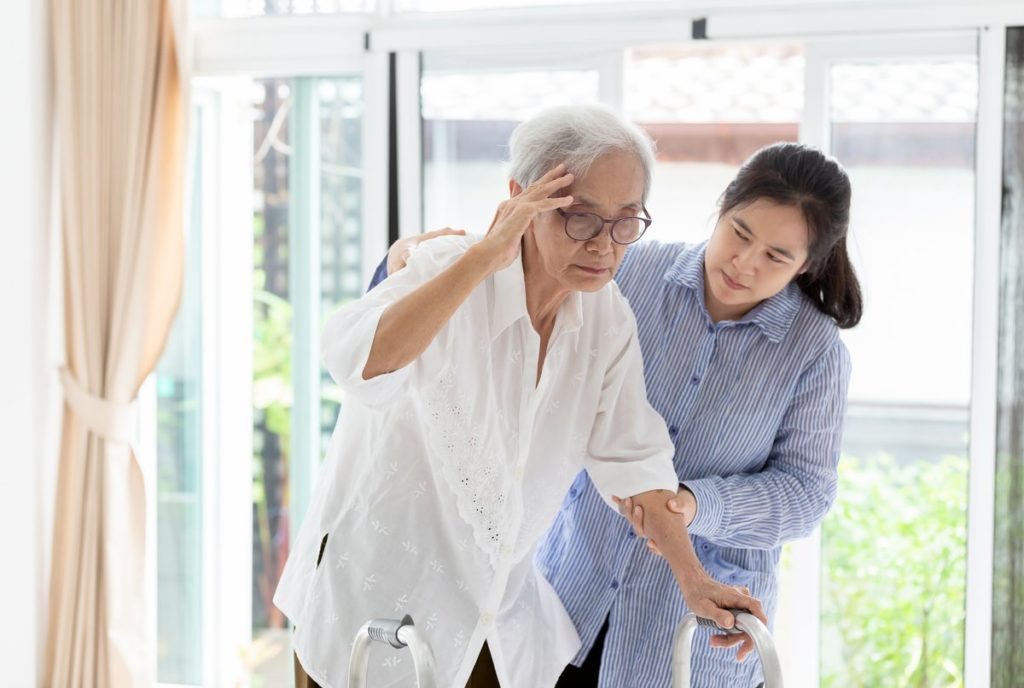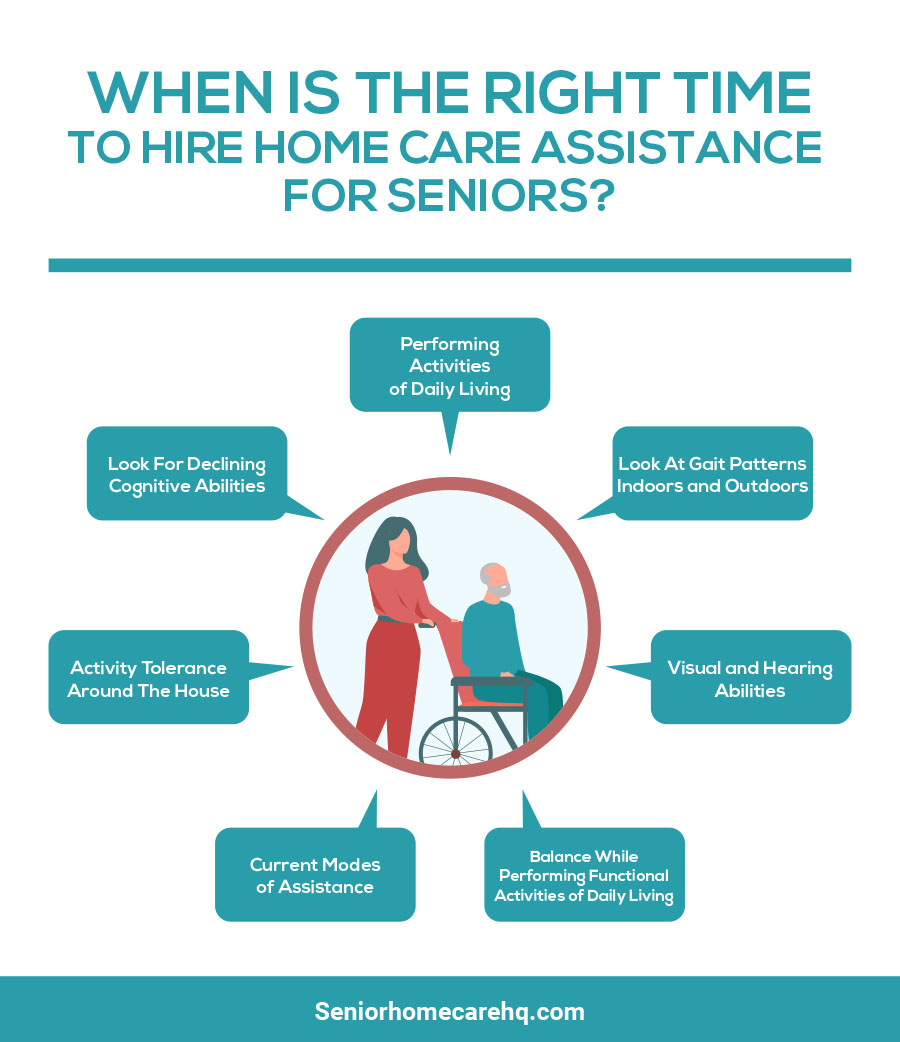
When Is the Right Time to Hire Home Care Assistance for Seniors?
Last Modified [last-modified]
[su_highlight]When Is the Right Time to Hire Home Care Assistance for Seniors?[/su_highlight]
When is the right time to hire home care assistance for seniors?
Unless trained to recognize the signs, family members and caregivers often feel concerned that they will not be able to notice the red flags (when the time comes) for when an aging loved one requires help at home.
Specifically, when is it the appropriate time to recruit professional in-home care assistance?
[su_highlight]Here Are Several Areas of Function (and what deterioration in those areas may look like) That Caregivers and Family Members Can Assess Before Making Those Decisions.[/su_highlight]
[su_service title=”Performing Activities of Daily Living” icon_color=”#5d7ffa”][/su_service]
Activities of daily living (ADLs) includes tasks that someone wants to or needs to complete during the day.
Examples include basics such as bathing, dressing, feeding, showering, toileting, and hygiene management (brushing teeth, washing hands, shaving, etc.).
More complex ADLs include medication management, finance management, household cleaning, cooking, meal preparation, and community participation (running errands, attending doctor appointments, visiting friends and family, etc.).
Illness, injury, and simply aging can impact a senior’s typical participation in any or all these tasks.
It becomes a problem when their health and safety is placed in jeopardy. Incidences may include increased infection risk due to lack of hygiene and care, increasing fall risk because they can’t maintain a clean-living environment, becoming malnourished, dehydrated, or ill because they are unable to access meals and medication on their own, etc.
[su_service title=”Balance While Performing Functional Activities of Daily Living” icon_color=”#5d7ffa”][/su_service]
There are two types of balance, and both are needed for general movement and walking: dynamic balance and static balance.
Dynamic balance involves challenging postural stability by walking, running, jumping, and turning. Static balance is the ability to maintain sitting or standing postural stability without any additional movement or external force.
As people age, their risk for losing their balance heightens which places them in a regular position of tripping or falling.
Many seniors who struggle with balance may be safe enough to walk with the use of a cane or a walker. Serious cases of imbalance may result in the use of a wheelchair.
Balance and the need for additional help becomes apparent when none of these devices are employed or are working, and when the senior is falling more on a regular basis.
[su_service title=”Look At Gait Patterns Indoors and Outdoors” icon_color=”#5d7ffa”][/su_service]
Gait patterns refer to the manner of how we walk. We all take specific patterns and steps in order to walk correctly and safely.
Abnormal gait patterns lead to disruption in typical walking, which can result in increased loss of balance and falls.
Gait patterns can become skewed due to older age, muscle weakness, and disorder (i.e. Parkinson’s disease, multiple sclerosis, stroke, etc.).
Many seniors can function well on their own despite having gait issues because they’ve learning to compensate with ambulation equipment or other walking strategies.
The need for assistance happens when these gait patterns worsen even with the help of devices, and when falls and injury become more frequent.
[su_service title=”Look For Declining Cognitive Abilities” icon_color=”#5d7ffa”][/su_service]
Reduced cognitive skills can very quickly turn home life into a safety hazard.
Forgetfulness, decreased judgment, and poor safety awareness can lead to accident and injury, especially if the affected person is home alone (i.e. forgetting to take medication, forgetting to eat, going outside without a walker, getting lost, forgetting to complete bills and other financial obligations, etc.).
This can happen due to effects of old age, but rapid cognitive decline is often associated with disorders such as Alzheimer’s disease and other neurological conditions.
[su_service title=”Activity Tolerance Around The House” icon_color=”#5d7ffa”][/su_service]
Commonly, age wreaks havoc on overall endurance. This becomes a concern for independent living when endurance is impacting a senior’s ability to complete certain household and personal tasks safely.
Examples include lacking the endurance to complete a shower which results in falls or injury.
[su_service title=”Visual and Hearing Abilities” icon_color=”#5d7ffa”][/su_service]
If visual and hearing changes (with accommodations such as hearing aids or glasses) have grown severe enough to pose dangers in the living environment, then it may be time to consider hiring professional assistance.
Examples include not being able to hear the smoke detector, house alarms, and phones or not being able to see settings on the oven, pets crossing in front of their feet, etc.
[su_service title=”Current Modes of Assistance” icon_color=”#5d7ffa”][/su_service]
Certain assistance tools may already be in place such as equipment and people. When those tools aren’t enough, then it may be time to investigate additional in-home help.
Common examples include when an aging spouse is no longer able to care for their loved one, family members or caregivers are unable to tend to seniors regularly, seniors aren’t safely using walkers, fall alarms, emergency lines, and the list goes on.
Once you have determined that a senior would benefit from in-home care, the next step is to research home care agencies and the types of assistance that can be provided.
[su_highlight]How Often Should In-Home Health Care Services Come?[/su_highlight]

This all depends on specific scenarios that merit professional assistance. If a senior recently underwent surgery or a short hospital stay and are discharging home, then maybe temporary in-home health will be recommended by relevant medical staff.
A senior with chronic illness or disability that either stagnates or worsens with age may need long-term in-home healthcare (neurological disorders, dementia, etc.).
Oftentimes, seniors will use a primary physician’s referral and recommendations (while considering health insurance coverage) to determine how often in-home health should be coming into the home.
[su_highlight]What Specific Services Do Seniors and Caregivers Living at Home Need?[/su_highlight]

Seniors as well as caregivers and family members should consider what services are available in in-home health agencies.
Research the services and talk to the primary physician about which services the senior would benefit from and which ones they could do without.
Depending on the agency, services could include in-home nursing care, social services, respiratory care, volunteer and recreational services, palliative care, and rehabilitation (speech, physical, and occupational therapy).
Settling on regular in-home services for a senior is a major decision, but it doesn’t have to be intimidating. Talk to your doctor and explore local resources.
Have an open and honest discussion with the senior about transitioning and accepting help at the right time.
Talk to friends who are in similar situations and work with an agency that you are comfortable with to make a plan-of-care that’s right for the senior and their time in life.


Comment ( 1 )
I never knew that in-home care could help the elderly in doing their chores and other physical activities. My friend talked about how looking after his aging aunt is making him lose his focus on studying. I should suggest that he consider hiring a home healthcare specialist for her.